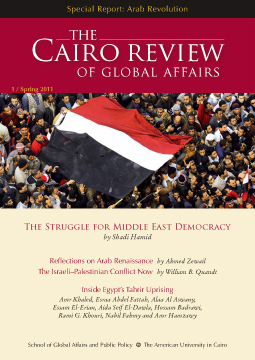Spring 2011

Cairo Review No. 1
Arab Revolution
Q & A
“I Want a Democratic Egypt”
“Facebook Girl” Esraa Abdel Fattah appeals to members of her generation to become active in political parties for the sake of rebuilding their nation
Faith and Hope in Egypt
Populist Muslim preacher Amr Khaled argues that economic development, religious coexistence, and international partnerships are keys to the country’s future
A More Assertive Arab Foreign Policy
Former Ambassador to the United States Nabil Fahmy believes that a democratic Egypt will not abandon its strategic commitment to peace but will pursue a more pro-active approach in international relations
From Dictatorship to Democracy
Political analyst Amr Hamzawy says that Egypt’s new challenge is to transform the “protesting citizen” into a “participating citizen”
Region in Revolt
Veteran analyst Rami G. Khouri predicts that the historic change sweeping the Arab world will lead to a secular rather than Islamist political order
Narrating the Revolution
Egyptian novelist Alaa Al Aswany explains how a nation rediscovered itself by rising up against dictatorship
Seeking Justice
Longtime activist Aida Seif El-Dawla demands that Egypt’s regime be held accountable for past—and ongoing—human rights abuses
Rise of the Brothers
Muslim Brotherhood spokesman Essam El-Erian says that with new political opportunities in post-Mubarak Egypt, the group seeks to “participate, not dominate”
Inside Egypt’s Uprising
Inside Egypt’s Uprising
“I Didn’t See it Coming”
Former National Democratic Party Secretary General Hossam Badrawi tells how the Tahrir revolution looked from inside the regime
Essays
The Struggle for Middle East Democracy
Why the Arab street finally revolted
Negotiating Peace in Sudan
An American perspective
Reflections on Arab Renaissance
A call for education reform.
The Israeli-Palestinian Conflict Now
How President Obama can get peacemaking back on track
Midan
Lisa Anderson’s World View
Upon entering the office of the American University in Cairo President Lisa Anderson, you’ll admire the beautiful colored globe prominently displayed on a table. But dozens of globes? There’s a collection of smaller globes on a bookshelf. There are bowls of tiny globes (key chains, actually) on a coffee table. Globes, globes, everywhere.
Islam and Gender
Butler is harsh on the tendency in the West, especially among feminists, to categorically condemn the veil. “Negotiating questions of sexuality and gender is not always done according to the same language you find in the U.S. or in France,” she explains.
Oriental Hall, Etc.
When Egypt’s popular uprising began on January 25, the American University in Cairo became part of the historic events.
A University and a Revolution
Three young Egyptians talk about their roles in the revolution
Training Arab Policy Makers
Due to its geography and political standing, Egypt has interacted with the wider world throughout its long history. In taking its place on the international stage, it has produced honored statesmen and Nobel laureates. It has provided numerous global public servants, including a secretary general of the United Nations and a director general of the International Atomic Energy Agency.
Book Reviews
Decision Points
Assessing the president from Texas.
Global Governance
Pondering how to run the world.
Aftershock
Reflecting on the American economic meltdown
The Worst-Kept Secret
The dangerous downside to Israeli nuclear transparency.
Arab Voices
How Arab public opinion matters.
